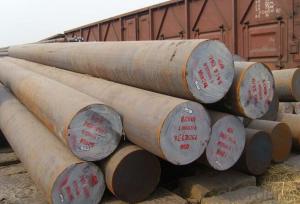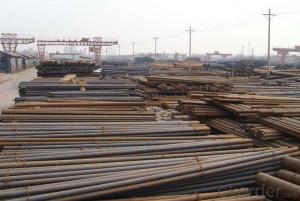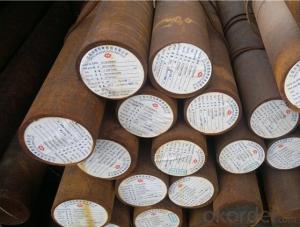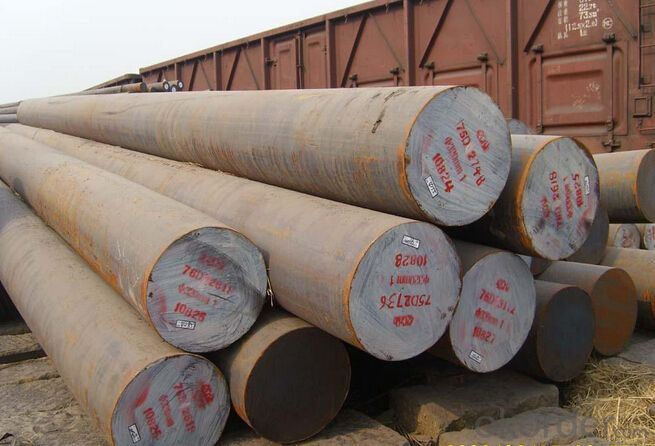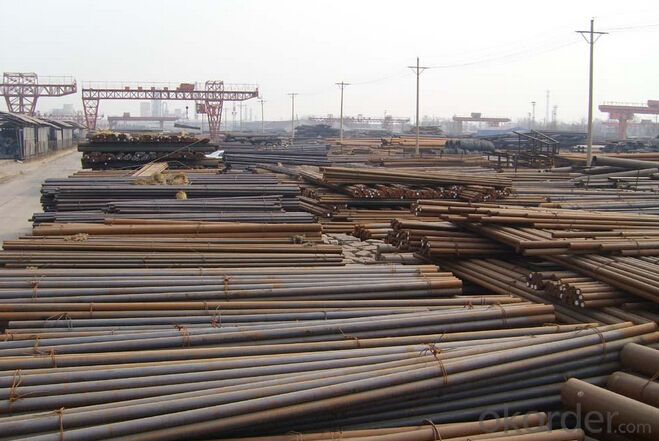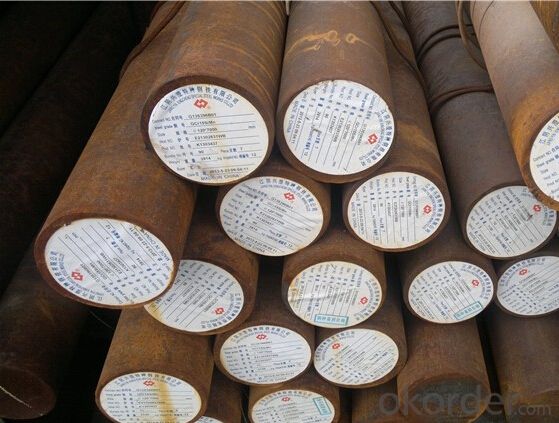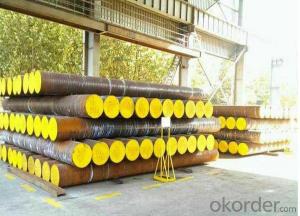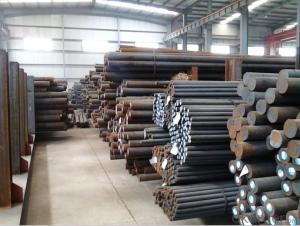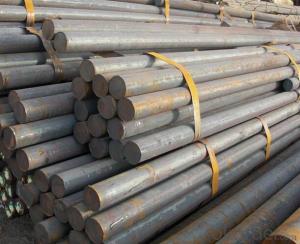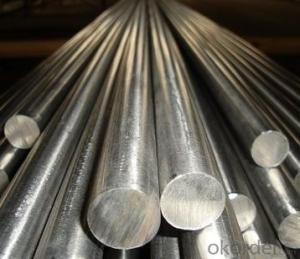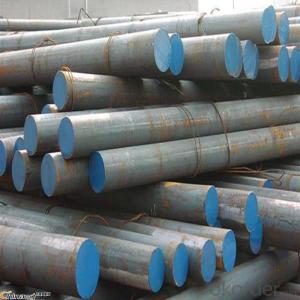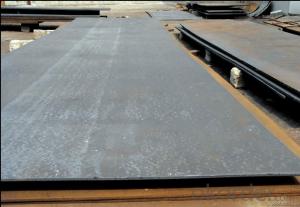Alloy Steel 35CrMo Special Steel Carbon Steel
- Loading Port:
- China main port
- Payment Terms:
- TT OR LC
- Min Order Qty:
- 25 m.t.
- Supply Capability:
- 10000 m.t./month
OKorder Service Pledge
OKorder Financial Service
You Might Also Like
Specification
Chemical Composition(%)
| C | Si | Mn | Cr | Mo | Ni | P | S |
| 0.32-0.40 | 0.20-0.40 | 0.40-0.70 | 0.80-1.10 | 0.15-0.25 | ≤0.30 | ≤0.035 | ≤0.035 |
Standard
| GB | AISI | DIN | JIS | BS |
| 35CrMo | 4137 | 34CrMo4 | SCM432 | 708A37 |
Available Size
| Rolled round bar | φ20-120mm × L |
| Forged round bar | φ130-195mm × L |
Characterstics
| The steel with high strength and toughness, hardenability is better also | |||||||
| After conditioning treatment quenching deformation of small | |||||||
| high fatigue limit and repeated impact resistance |
Applications: The steel is suitable for manufacturing requires a certain strength and toughness of large and medium-sized plastic mold


1, Your advantages?
professional products inquiry, products knowledge train (for agents), smooth goods delivery, excellent customer solution proposale
2, Test & Certificate?
SGS test is available, customer inspection before shipping is welcome, third party inspection is no problem
3, Payment Terms?
30% TT as deposit and 70% before delivery.
Irrevocable L/C at sight.
4, Trading Terms?
EXW, FOB, CIF, FFR, CNF
6, After-sale Service?
We provides the services and support you need for every step of our cooperation. We're the business partner you can trust.
For any problem, please kindly contact us at any your convenient time.
We'll reply you in our first priority within 24 hours.
- Q: How does special steel perform in terms of impact resistance?
- Special steel typically performs very well in terms of impact resistance. It is specifically designed to withstand high impact forces without deforming or breaking. This type of steel is often used in applications where strength and durability are crucial, such as in construction, automotive, and aerospace industries. Its superior impact resistance properties make it highly reliable and capable of withstanding heavy loads and sudden impacts.
- Q: How is high-temperature steel used in the production of furnace components?
- High-temperature steel is used in the production of furnace components due to its exceptional heat resistance and strength. This type of steel can withstand extreme temperatures without losing its structural integrity, making it ideal for lining furnace walls, constructing heating elements, and manufacturing other critical parts that are exposed to intense heat.
- Q: How is special steel used in the production of automotive parts?
- Special steel is commonly used in the production of automotive parts due to its exceptional strength, durability, and resistance to wear and corrosion. It is utilized in various components such as engine components, transmission gears, axles, suspension systems, and chassis parts. The use of special steel ensures that automotive parts can withstand extreme conditions and heavy loads, thereby enhancing the overall performance and safety of vehicles.
- Q: What are the future trends in special steel manufacturing?
- Some of the future trends in special steel manufacturing include advancements in technology and automation, increased focus on sustainability and environmental impact, development of new alloys and materials with enhanced properties, and growing demand for specialized steels in industries like aerospace, automotive, and renewable energy. Additionally, there is a shift towards customization and tailored solutions to meet specific customer requirements, as well as an emphasis on research and development to drive innovation in the field.
- Q: How does special steel contribute to the pharmaceutical aftermarket industry?
- Special steel plays a significant role in the pharmaceutical aftermarket industry by providing high-quality materials for manufacturing critical components such as machinery, equipment, and tools. The unique properties of special steel, such as corrosion resistance, strength, and durability, ensure the production of efficient and safe pharmaceutical products. Additionally, special steel's ability to withstand extreme temperatures and pressures enables the creation of advanced processing systems, leading to improved efficiency and productivity in pharmaceutical manufacturing.
- Q: How does special steel contribute to the power generation equipment industry?
- Enhanced performance, durability, and reliability are crucial contributions of special steel to the power generation equipment industry. Turbines, generators, and transformers, which operate in harsh conditions characterized by high temperatures, pressure, and corrosive environments, benefit from the unique properties and characteristics of special steel. An advantage of special steel in power generation equipment lies in its capacity to withstand high temperatures. Heat-resistant steel alloys, explicitly designed for extreme conditions, enable power plants to function efficiently and safely at elevated temperatures. These steels maintain their strength, structural integrity, and resistance to creep and fatigue even under the highest operating temperatures, guaranteeing the reliability and longevity of the equipment. Moreover, special steel exhibits excellent corrosion resistance, a critical feature for power generation equipment due to the presence of corrosive elements like water, steam, and chemicals. Stainless steel, in particular, is highly utilized in power plants thanks to its remarkable corrosion resistance, preventing equipment degradation and reducing maintenance costs. By employing special steel, power generation companies can minimize downtime and improve overall efficiency. Furthermore, special steel contributes significantly to the power generation equipment industry by providing exceptional strength and mechanical properties. This is especially crucial for large-scale equipment like turbines and generators, which face high mechanical loads. High-strength special steel allows these components to withstand stress and pressure, ensuring their safe and reliable operation over extended periods. Additionally, special steel's unique properties, such as high hardness and wear resistance, make it suitable for critical components like blades and rotors, minimizing the risk of failure and enhancing overall performance. In conclusion, special steel is an indispensable material within the power generation equipment industry. Its ability to endure high temperatures, resist corrosion, and provide exceptional strength and mechanical properties ensures the reliability, durability, and efficiency of power plants. Through the utilization of special steel, power generation companies can enhance equipment performance and reduce maintenance costs, ultimately contributing to the sustainable and dependable production of electricity.
- Q: How does special steel contribute to energy efficiency?
- Special steel contributes to energy efficiency in several ways. Firstly, special steel is used in the construction of energy-efficient appliances and equipment, such as refrigerators, air conditioners, and turbines. The high strength and durability of special steel allow for more efficient operation and reduced energy consumption of these devices. Additionally, special steel is utilized in the manufacturing of energy-efficient vehicles, such as hybrid and electric cars. The lightweight yet strong properties of special steel enable the production of lighter vehicles that require less energy to propel, improving fuel efficiency and reducing emissions. Overall, special steel plays a crucial role in enhancing energy efficiency across various industries, contributing to a more sustainable and environmentally friendly future.
- Q: What are the different non-destructive testing techniques used for special steel?
- There are several non-destructive testing (NDT) techniques that are commonly used for special steel to ensure its quality and integrity without causing any damage. These techniques are essential in industries where special steel is used, such as aerospace, automotive, and construction, to ensure that the material meets the required specifications and standards. Some of the commonly used NDT techniques for special steel are: 1. Ultrasonic Testing (UT): This technique involves the use of high-frequency sound waves to detect internal flaws, such as cracks, voids, or inclusions, in special steel. UT is highly effective in detecting subsurface defects and is widely used due to its versatility and accuracy. 2. Magnetic Particle Testing (MT): MT is a technique that uses magnetic fields and iron particles to detect surface or near-surface defects in special steel. It is particularly useful in identifying defects like cracks, seams, or laps, as the magnetic particles will accumulate at these locations, making them visible under proper lighting conditions. 3. Liquid Penetrant Testing (PT): PT is a widely-used method for detecting surface defects in special steel. It involves applying a liquid penetrant to the surface of the material, which seeps into any surface cracks or defects. After a specified time, the excess penetrant is removed, and a developer is applied to make the defects visible. 4. Eddy Current Testing (ET): ET utilizes electromagnetic induction to detect surface or near-surface defects in special steel. It is particularly useful in detecting cracks, corrosion, or metal loss in conductive materials. ET is a fast and accurate method, making it suitable for high-speed production environments. 5. Radiographic Testing (RT): RT involves the use of X-rays or gamma rays to examine the internal structure of special steel. It can detect various defects, including porosity, inclusions, and cracks. RT provides detailed images that help identify the location, size, and severity of defects. 6. Visual Testing (VT): VT is a simple yet crucial technique that involves a visual examination of the surface of special steel. It helps identify surface defects like scratches, dents, or corrosion. Although VT is not as sensitive as other NDT techniques, it is often used as a preliminary inspection method. Each of these non-destructive testing techniques has its own advantages and limitations. The selection of the appropriate technique depends on factors such as the type and size of the special steel, the required inspection depth, and the specific defects that need to be detected. By using a combination of these techniques, manufacturers and inspectors can ensure the quality and reliability of special steel products.
- Q: How does special steel contribute to reducing product waste during manufacturing?
- Special steel contributes to reducing product waste during manufacturing by offering enhanced properties such as durability, strength, and corrosion resistance. This allows manufacturers to produce longer-lasting and more reliable products. By using special steel, companies can reduce the need for frequent replacements, repairs, or discarded products due to wear and tear. This not only minimizes material waste but also reduces the environmental impact associated with manufacturing processes.
- Q: What are the main factors that determine the cost of special steel?
- The main factors that determine the cost of special steel include the raw material costs, production techniques and processes involved, the complexity of the steel's composition, the level of customization required, and market demand and supply dynamics.
Send your message to us
Alloy Steel 35CrMo Special Steel Carbon Steel
- Loading Port:
- China main port
- Payment Terms:
- TT OR LC
- Min Order Qty:
- 25 m.t.
- Supply Capability:
- 10000 m.t./month
OKorder Service Pledge
OKorder Financial Service
Similar products
Hot products
Hot Searches
Related keywords
